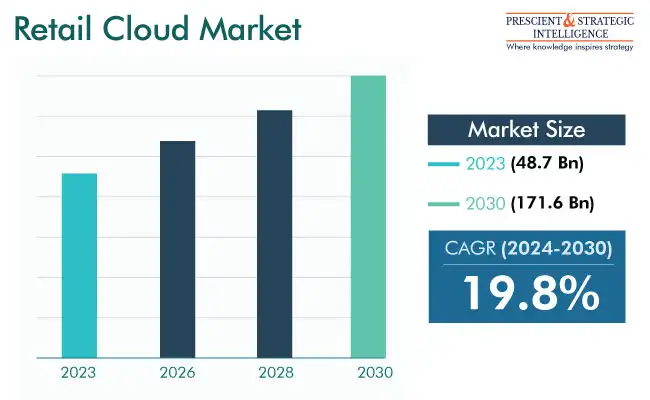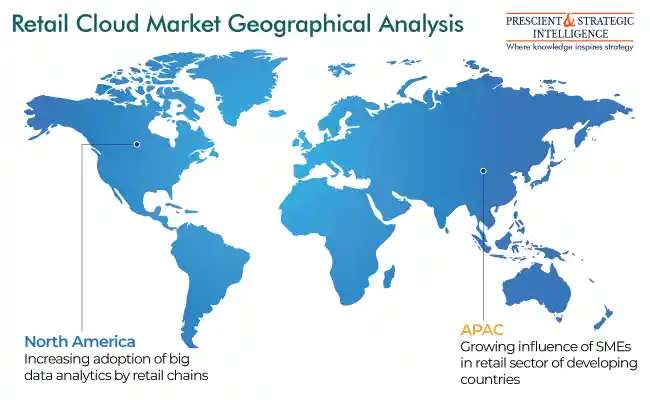Report Code: 10840 | Available Format: PDF
Retail Cloud Market Revenue Forecast Report: Size, Share, Recent Trends, Strategic Developments, Segmentation Analysis, and Evolving Opportunities, 2024-2030
- Report Code: 10840
- Available Format: PDF
- Report Description
- Table of Contents
- Request Free Sample
Market Overview
The retail cloud market is expected to advance from USD 48.7 billion in 2023 to USD 171.6 billion in 2030, at a huge 19.8% CAGR between 2024 and 2030.
This growth is mainly because of the rising acceptance of cloud computing among retailers because it provides efficient and cost-effective solutions. Moreover, there is an increasing need for flexibility as well as scalability in the retail industry, which the cloud technology can deliver, enabling businesses to adapt rapidly to the shifting industry conditions.

Rising Acceptance of Multi-Cloud Architectures To Boost Market
Multi-cloud employment has become widespread in retail as businesses realize the advantages of this approach. The retail sector has specific requirements for robust, stable, and flexible IT infrastructure, to manage brick-and-mortar operations online. Vendors can use multi-cloud environments to upgrade their IT infrastructure to individual needs, thus lowering the possibility of information loss, data breaches, or downtime.
Furthermore, such an architecture increases the flexibility and robustness of services and applications. By spreading work across multiple data centers, cloud can reduce the risk of outages and assure customers of full accessibility. In addition, the expandability of multi-cloud architectures helps ensure performance and minimizes costs during times of high utilization.
Growing Focus on Omni-Channel Experience Is Major Driver
The omni-channel system is a kind of communication platform through which customers can reach various sales and media channels. All the channels of communication with the enterprise are thus joined together to create a single point of services for the customer.
According to a survey published in Harvard Business Review, 73 % of the shoppers go through several channels during their shopping journey. This forces retailers to work toward improving the omni-channel experience, as the overall experience is a key factor that decides whether a customer will shop again with a particular brand or not.
Moreover, the omni-channel model generates immense amounts of customer information. Big data tools can help them use this information when making purchase arrangements and to get a clear picture of customer behavior, needs, and feedback.
For instance, Guitar Center Inc., which sells musical instruments, recently moved its data to Oracle Corporation’s cloud platform, to more effectively manage the surge in its online and brick-and-mortar business for guitars and drums as well as lessons on how to play them.
Increasing Popularity of Online Shopping
The growth of the e-commerce sector is a strong driver for the market as online portals create a massive volume of customer data, which needs to be properly stored, shared, and analyzed. As per reports, the global e-commerce sector is already worth around USD 6 trillion and accounts for roughly 20% of the global retail sales revenue. Retail cloud solutions allow companies to store huge volumes of data securely, without too much investment in on-site computer hardware.
Solutions Category Is Larger Contributor
The solutions category, based on offering, dominates the industry in 2023. This is due to the rising demand for consumer management, workforce management, and supply chain management software delivered via the cloud. Consumer management solutions seek to increase satisfaction, retention, and engagement through the tracking of data and personalization of product recommendations and advertisements.
Moreover, supply chain management solutions improve order, supplier, and inventory coordination for greater productivity. Workforce management solutions effectively manage shifts, benefits, and attendance, while monitoring and encryption are mechanisms that data security solutions employ to defend against threats or illegal access.
With businesses becoming increasingly complex, these solutions will be needed even more in the future to guarantee smooth performance and improved productivity.
The services category will advance at a significant rate during this decade. This is due to the increasingly complex nature of retail work, which is creating a requirement for specialized services. Moreover, the trend of cloud-enabled retail solutions has created a space that service providers can fill as retailers seek to offload their internal IT operations to third parties.
| Report Attribute | Details |
Market Size in 2023 |
USD 48.7 Billion |
Revenue Forecast in 2030 |
USD 171.6 Billion |
Growth Rate |
19.8% CAGR |
Historical Years |
2017-2023 |
Forecast Years |
2024-2030 |
Report Scope |
Market Trends, Drivers, and Restraints; Revenue Estimation and Forecast; Segmentation Analysis; Impact of COVID-19; Companies’ Strategic Developments; Market Share Analysis of Key Players; Company Profiling |
Explore more about this report - Request free sample
Large Enterprises Category Is Larger Contributor
Based on enterprise type, the large enterprises category is the larger contributor to the industry in 2023. This is because these companies have abundant resources and infrastructure to support retail cloud adoption. In the case of large enterprises, on top of enhancements to operations, cloud scalability and flexibility can make a rich contribution to customers' experience. Moreover, cloud computing enables them to save on IT infrastructure expenses, rapidly use new services and applications, and access strong security measures.
The small & medium enterprises category will propel at a significant rate during this decade. The advantages of cloud computing for small and medium-sized businesses include continuous adaptability to changing operational needs, along with possible cost reductions.
As SMEs become more familiar with the cost savings and operating efficiency advantages that cloud technology can provide, retail cloud adoption will grow rapidly in the coming years.
Public Cloud Is Leading Deployment Model Category
The public cloud category, based on deployment model, is the largest contributor to the industry in 2023. Its benefits for retailers include flexibility, expandability, and economics in data storage and processing capability. Several key IT vendors offer data storage and sharing, customer relationship management, and integrated e-commerce software via the public cloud, which allow for a start-to-finish shopping experience.
Moreover, in January 2023, Google Cloud launched four new functions and improved its artificial intelligence capabilities in order to provide consumers with a better online purchasing experience and help companies better manage their stock.
SaaS Category Holds Largest Market Share
Based on service, the SaaS category accounts for the largest share in 2023. This is because the SaaS model allows retailers to avoid spending on hardware and software licenses, thus helping reduce IT infrastructure costs. Moreover, software delivered via the SaaS model enables retailers to control users and functions. Since SaaS can be used anywhere, it is a perfect fit for global enterprises. Furthermore, SaaS platforms are quite simple—even retailers who have little technical ability can quickly adapt to these solutions.
North America Is Dominating Market
North America leads the industry in 2023 because of the high cloud computing penetration, surging need for insights and data analytics in the retail sector, and increasing acceptance of omni-channel retail methods.
Furthermore, the presence of many major retailers strengthens the regional industry. Canada and the U.S. stand out as major contributors to the global market expansion because of their mature and strong retail sectors and robust focus on innovation and technology.
APAC will advance at the highest rate in the years to come, owing to the increasing need for cloud-based services among the SMEs in the region. Recognizing the benefits of cloud solutions, SMEs are accepting these technologies to improve their positions and operations. Moreover, with the growing population, it is becoming harder for retailers in the region to handle costumers’ data manually. As a result, computer software is rapidly penetrating the retail sector, and to keep their IT spending in check, companies here are adopting cloud solutions.

Retail Cloud Market Major Companies
- Accenture plc
- Amazon.com Inc.
- Cisco Systems Inc.
- Google LLC
- Fujitsu Limited
- Oracle Corporation
- IBM Corporation
- Salesforce Inc.
- Atos Syntel Inc.
- SAP SE
- Epicor Software Corporation
- Microsoft Corporation
- Infor Inc.
- Alibaba Group Holding Limited
- Cognizant Technology Solutions Corporation
- Wipro Limited
Want a report tailored exactly to your business strategy?
Request CustomizationWant an insight-rich discussion with the report author?
Speak to AnalystOur dedication to providing the most-accurate market information has earned us verification by Dun & Bradstreet (D&B). We strive for quality checking of the highest level to enable data-driven decision making for you
Our insights into the minutest levels of the markets, including the latest trends and competitive landscape, give you all the answers you need to take your business to new heights
With 24/7 research support, we ensure that the wheels of your business never stop turning. Don’t let time stand in your way. Get all your queries answered with a simple phone call or email, as and when required
We take a cautious approach to protecting your personal and confidential information. Trust is the strongest bond that connects us and our clients, and trust we build by complying with all international and domestic data protection and privacy laws